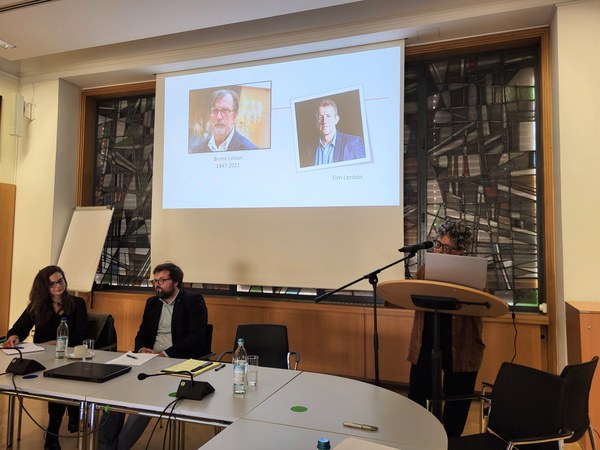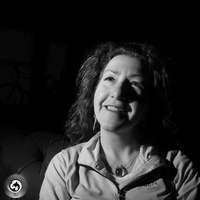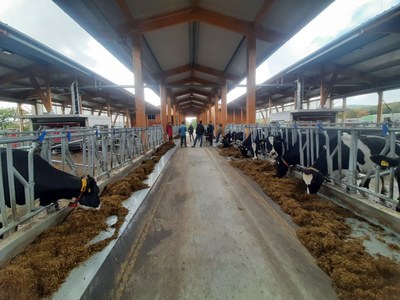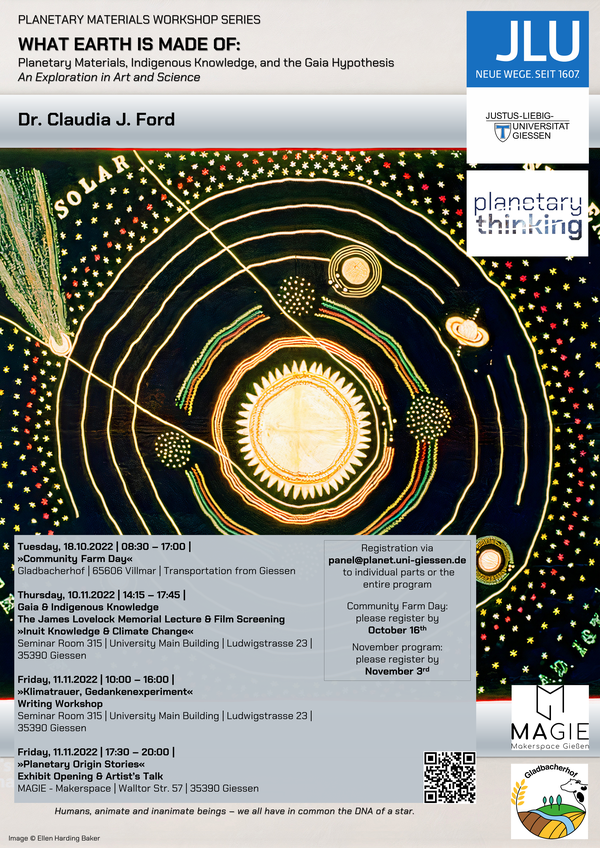Media
Reflections: Planetary Materials-Workshop Series 18 October - 12 November 2022

|
|
This year, our fellow Claudia J. Ford’s workshop series “What Earth is Made of” took place on Oct. 18th, and Nov. 10th & 11th, 2022. The series reflected on James Lovelock’s Gaia hypothesis from an indigenous perspective to deepen our understanding of planetary materials and their constellations through art and science. The series connected indigenous ideas about ecology with the climate crisis and engaged the participants in storytelling through all of the senses – hands on farm labor, film, creative writing, lectures, listening, dialog, and an exhibition of climate change and planetary materials inspired visual art.
The workshop series commenced on Oct. 18th with an excursion to JLU’s Gladbacherhof farm. The focus was on one of the most fundamental relationships between humans and the environment – namely food production and nutrition.
On Nov. 10th, Ford delivered a stimulating hybrid lecture on indigenous knowledge and Gaia hypothesis as second event of the workshop series took place. The lecture memorialized James Lovelock (1919 – 2022), who formulated the Gaia hypothesis in the 1970s along with Lynn Margulis (1938 – 2011). Ford reiterated that the earth is a living being in a delicate state of balance and harmony, to whose wellbeing we are all obliged. She also paid homage to the French philosopher and anthropologist Bruno Latour (1947 – 2022), whose ideas resonated with Lovelock’s Gaia theory. Ford raised the point that these esteemed thinkers failed in pointing out that their ideas of the Earth being an interdependent system were not all that new. Predating Lovelock’s considerations by millennia, indigenous thinkers and storytellers have been reflecting on how the earth as a living self-aware system may be capable of feedback and self-correction, especially in its self-regulation of the climate.
Ford emphasized that in the face of the current climate crisis, the stories we tell about ‘nature’ must shift from global to planetary imaginaries. To do so, she called for acknowledging and drawing on existing indigenous knowledge in Western science, as they offer alternative paradigms that are truly transdisciplinary. The extensive bibliography researched for her lecture can be found here.
The lecture was followed by the film screening of the documentary “Inuit Knowledge & Climate Change” (2010), the first ever Inuktitut language film directed by Zacharias Kunuk and Ian Mauro. The film took the viewers on a journey with the Inuit elders and hunters whilst exploring the social and ecological impacts of a warming Arctic. The day wrapped up with an informal gathering at the Planetary Hub where the Panel and the guests closed the evening with vegan fingerfood and pleasant conversations.
On Nov. 11th, Ford conducted a writing workshop to express climate grief through creative arts. Participants got an opportunity to practice creative nonfiction environmental writing using planetary materials, which they found in their immediate environment as prompts. Afterwards, the participants voluntarily shared their pieces of writing with the audience.
In the evening, the workshop series came to a grand conclusion with a festive opening of the exhibition “Planetary Origin Stories”: a collage exhibit at MAGIE - Makerspace Gießen created by Ford during her fellowship. Mehr Impulse opened the reception serenading the event with their melodies, and Ford explained her inspiration behind the exhibit during an artist’s talk. The exhibit was intricately woven around the subject matter of ecological destruction and climate grief (one might consider unpleasant) yet the beauty and finesse of Ford’s pieces paid tribute to the color, shape and form of the natural world and recounted our collective responsibility to safeguard the Earth’s beauty and resources.
Our sincere gratitude goes to Claudia for conceptualizing this multifaceted program, to our keen participants, as well as to Johannes and the team at the Makerspace Giessen for their support to make this workshop series a huge success!

|
 |
Nov 10 & 11, 2022 - "Narratives of Environmental Knowledge in the Anthropocene" & "Sacred Feminine Birthing the New" - Responses to "What Earth Is Made Of"
We are delighted to announce the participation of two expert scholars in our Workshop-Series: Dr. Ayşe Dayı and Dr. Matthias Klestil will kindly be giving responses as part of our Planetary Materials Workshop-Serie „What Earth is Made Of”.
|
Matthias Klestil delivered a response titled "Narratives of Environmental Knowledge in the Anthropocene" following Claudia J. Ford's James Lovelock Memorial Lecture. He is Postdoctoral Assistant in American Studies at the University of Klagenfurt, Austria. He received his PhD from the University of Bayreuth, Germany, and was Bavarian Fellow at the Library of Congress, Washington, D.C. In his doctoral thesis he examined the interplay of mankind and nature and explored African American texts from an ecocritical perspective. Klestil’s first book Environmental Knowledge, Race, and African American Literature is forthcoming with Palgrave Macmillan (2023); his recent publications include scholarly articles on Colson Whitehead and Ted Chiang’s short fiction. Klestil’s current research project focuses on narrative theory, the Anthropocene, and contemporary North American fiction and film. |
 |
|
Dr. Ayşe Dayıs contribution "Sacred Feminine Birthing the New" responded to Claudia Ford's Artist's Talk during the opening of the "Planetary Origin Stories exhibition" (Nov. 11, 5:30 p.m.). She is a psychologist, medical sociologist, healer and mindfulness trainer. After receiving her PhD from Penn State University, Ayşe worked over 15 years in universities in the U.S., Turkey, France, Switzerland and Germany, teaching and conducting research on women´s sexual/reproductive health rights. Her latest publication is the book “The Politics of the Female Body in Contemporary Turkey Reproduction, Maternity, Sexuality” which she co-edited with Drs. Alkan, Yarar and Topçu (2021, IB Tauris). In 2020, Ayşe established Orca Dreams: Platform for Mindful Living (www.orca-dreams.com) where she provides education and consultation on holistic health and mindfulness to individuals and organizations around the globe. In this platform Ayşe integrates her academic and activist knowledge on health with her mindfulness knowledge and practice to support individuals, groups and institutions through the great transformation of consciousness experienced by GAIA and ourselves. She will facilitate a women’s healing circle Remembering & Honoring my Sacred Feminine February-March 2023 at VHS-Mitte, Berlin. |

|
Oktober 18, 2022 - Excursion report: Community Farm Day @ Gladbacherhof

|
|
On Oct. 18, the kickoff event for our Fellow Claudia Ford's workshop series "What Earth is Made of?" took place. The event series serves to rethink the human relationship to the earth and its materialities by combining diverse perspectives from applied fields, science, and the arts. In the first workshop, the focus was on one of the most fundamental relationships between humans and the environment - namely food production and nutrition. To this end, our excursion took us to the Gladbacherhof farm, which combines organic farming and research: on the productive organic farm, research is conducted in cooperation with the JLU to further develop sustainable concepts for organic farming.
The day started with a tour of the newly built dairy cattle research barn, where fully automated milking machines and a fully automated feeding and cleaning system are intended to enable both the study of climate gas emissions in organic farming as part of the Green Dairy project and, in terms of animal welfare, a greater degree of self-determination for the animals.
After a lunch prepared by Veganatural with the farm's own products, the group heard scientific presentations on various topics. In addition to considerations on decision-making criteria for farmers in dealing with sustainable technologies, new approaches in agroforestry and a plea for more care in agriculture were discussed. There was also a tour of the on-site laboratory facilities.
Lastly, the agroforestry techniques discussed in the lecture could be seen in application as Philipp Weckenbrock showed the group around the agroforestry area of the farm. Agroforestry uses a specific planting strategy in an attempt to arrange multiple levels of food production into a single cohesive system. Specifically, the farm's experimental setups are designed to examine the productivity of mixed systems between trees and traditional agricultural crops such as cereals or potatoes. Although they have not been widely used in practice, agroforestry systems promise some advantages, such as greater resilience and resistance to climatic changes, erosion, and increased water storage capacity of the soil.
The field trip allowed us to gain in-depth insights into a fascinating combination of research and agricultural practice in organic farming.
|

|
Oktober 18 and November 10 - 11, 2022 - Planetary Materials Workshop "What Earth is Made of"
|
Planetary Materials Fellow Claudia J. Ford's workshop series will take place on October 18 and November 10 and 11. Ford's work focuses on our relationship to planetary materials. As a scientist and artist, it is important to Ford that participants experience their own relationship to the Earth with all their senses. Accordingly, the series kicks off with the excursion to Gladbacherhof on October 18, where the experience of agricultural work will lead us to reflect on our relationship with food and its production. The events on November 10 and 11, broaden the focus and direct attention to experiencing one's own relationship with nature in the context of society and the current climate crisis. What role can James Lovelock's Gaia Theory and a relational understanding of our Earth play in this setting? In addition to exploring scientific aspects in a lecture and film screening, participants will also be invited to engage creatively with the question in a writing workshop on climate grief and a vernissage with collages on "Planetary Materials." We cordially invite all interested parties to join us at one or more events of this exciting program. Here you can find more information about the individual events and registration.
|

|
June 23-25, 2022 - "Planetary Forest - Bring the Forest to the Garden": workshop, vernissage and accompanying exhibition
|
The performative action "Planetary Forest: Bring the Forest to the Garden" from June 23-25, 2022 was the highlight of the first cohort in the Planetary Scholars and Artists in Residence program. This first year of the program centers around the theme "Planetary Materials" and the first Fellows, Claudia Hartl, Clemens Finkelstein, and Mathias Kessler, approached the topic from very different perspectives. As an integral part of trees and thus the forest, wood became the planetary focus material of the semester as well as the central leitmotif for the Planetary Workshop: Led by the Fellows, on Thursday morning a small diverse group explored the planetary dimension of human-forest-climate interactions in the Rosbach City Forest. Clemens Finkelstein, employing a historical and socio-cultural perspective, offered interesting insights into the forest's history of use and the relationship of people to "their forest". Claudia Hartl was able to provide participants with a climatological and dendrochronological point of view: She demonstrated how to take a drill core and used the sample to explain the broad field of tree ring research and the complex relationships between forest health and climate. In addition to sharing knowledge, experiencing the forest and exchanging ideas in and with the group formed a central part of the day. Thus, among others, a member of the local BUND group, an expert in hydrogeology, an employee of the JLU fleet, various colleagues of the department 09, and temporarily even the Rosbach mayor Steffen Maar added to the workshop with their expertise. The latter was available for questions and explained the background of the disturbed area as well as the planned reforestation measures for the site. Afterwards, participants and Fellows alike collected forest material for the living sculpture planned by Mathias Kessler: litter, dead wood, topsoil, roots and even the odd seedling found their way into the trailer. Mathias Kessler also accompanied the trip with his camera and will artistically process the recordings in a short film - soon available on our YouTube channel. On the following day, the Fellows designed the living sculpture as an image of a forest habitat in the Botanical Garden. For now, the fenced-off piece of a disturbed forest site will remain untouched for three years, and its development will be watched expectantly: Will the forest make its way into the garden, will the garden reclaim the area, or perhaps nothing will happen for a while? The sculpture was opened in the festive setting of a vernissage with catering and live music, to which we were also pleased to welcome the President of the JLU, Prof. Dr. Joybrato Mukherjee. In a subsequent article (in German), the Gießener Allgemeine newspaper praised the action for its character as planetary food for thought. We cordially invite you all to visit the living work of art and send dated photos to panel@planet.uni-giessen.de. Experience the Rosbacher City Forest in the Botanical Garden Giessen! For two weeks, the Neuer Kunstverein Gießen e.V. also hosted an accompanying exhibition at its premises, which documented the work of the three Fellows at the Panel on Planetary Thinking. On display were, among others, Line Drawings and "The Arctic Ocean - Failed Hope" by Mathias Kessler, Vibrascapes by Clemens Finkelstein and Dendro Art by Claudia Hartl. We would like to express our sincere gratitude to the city of Rosbach, the forester Eva-Maria Kirchler, the management of the Botanical Garden, the Neuer Kunstverein Gießen e.V. as well as the president of the JLU for their ongoing support in this extensive project! |
|

|

|



